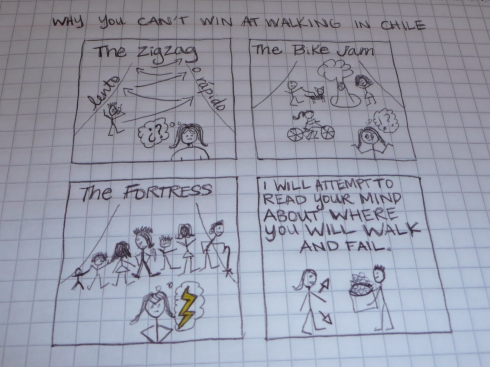In Santiago I stayed with my friend Cori and her husband Cesar. They were excellent hosts with lots of Chilean wine at the ready!
While walking around Santiago many parts felt familiar, yet changed in the three years since I’ve lived there. Walking around the cuico (rich) areas of town felt otherworldly– where did all of these foreigners come from?
Balding men in Corvette (or enter large company name here) polos who seemed like they would sooner be the butt of one of Jeff Foxworthy’s Red Neck jokes than lunching in a Santaigo sidewalk cafe were scattered everywhere, lunching in sidewalk cafes on business meetings!
I could make the few block walk from the metro to the apartment without hearing a single word of Spanish. Men and women in business casual were speaking English on their way into Starbucks.
Luckily, old men in newsies hats still dotted the streets, seemingly strategically placed as a reminder of a different time. They were anchors to the past, the last living reminders that this extremely modern city sprung up around them and not the other way around.
While studying abroad in Santiago I was often frustrated at the effects of the modernization and growth of the city. I thought that it left it sterile and out of touch with its Latin American roots. These same perks of the modern city I couldn’t help but LOVE this time around: its organization, clean streets, bus schedules and routes that you can check online, street art, international chain stores and restaurants, people who keep to themselves (and therefore don’t comment on your 1-pound fluctuation in weight, etc.), and access to art, culture and public spaces!
You mean we can play in this beautiful park?
Or walk through this sculpture garden?
Or randomly get off of the subway and run into an excellently curated and free Animal Extinctions Mini-Museum INSIDE of the Metro Station?
Or meet up with old friends who are shaping up to be the movers, shakers, and entrepreneurs of Santiago to reminisce, talk about ideas, the challenges of development, and drink borgoña? (red wine with lots of added sugar and fruit)
Or go to an art museum for free (or a small suggested donation) that has spaces for children to play, learn, interact, and do art themselves?
Or go for a run and then end up in an adult playground of gym equipment?
I guess this graffiti says it best, “Turn off the television! Turn on your mind.”
That’s what I was loving about Santiago, what I miss about home, and what I fear on a daily basis is missing in Paraguay (except, perhaps in Asunción or Encarnación).
I loved that should someone want to actually turn off the television and walk out of their house there were all sorts of things at their fingertips– books to be bought from vending machines or libraries in the metro, free events in the park, kids to play with and people to bump into in the park.
Bumping into literature, art, culture, museums, people who are different than you…Santiago was almost forcing these things down your throat at every turn of the corner. I LOVED IT! The city was making things that were once a luxury accessible to a more general public, the kind of thing that will help spur creativity, innovation, and critical thinking now and in future generations.
Santiago is obviously not without its faults– major smog problems, major public education strikes in the past year, and one of the most unequal distributions of wealth in Latin America, to name a few.
But on the whole Santiago is an enjoyable city and at least seems to be making an effort to open up cultural and educational spaces to populations that traditionally have been excluded from them in the past. The city of Santiago has half a million more people than Paraguay has in its entire country and therefore access to a lot more variety of and just a lot MORE resources. Yet I still think the principles of the recent development initiatives are good and could be modified or used to inspire goals for places like Paraguay!








